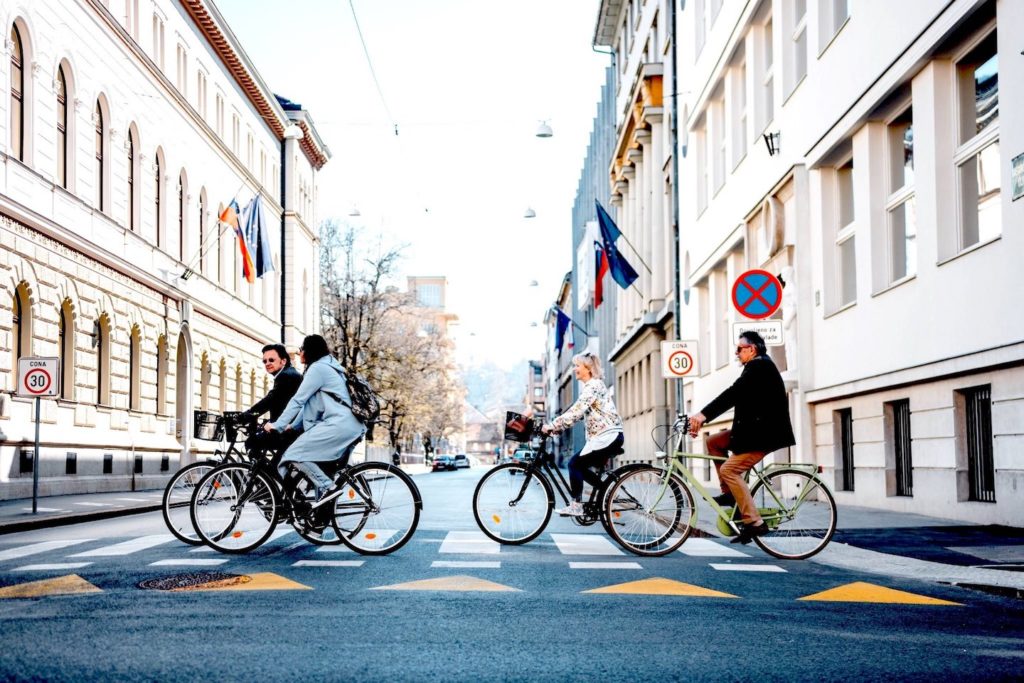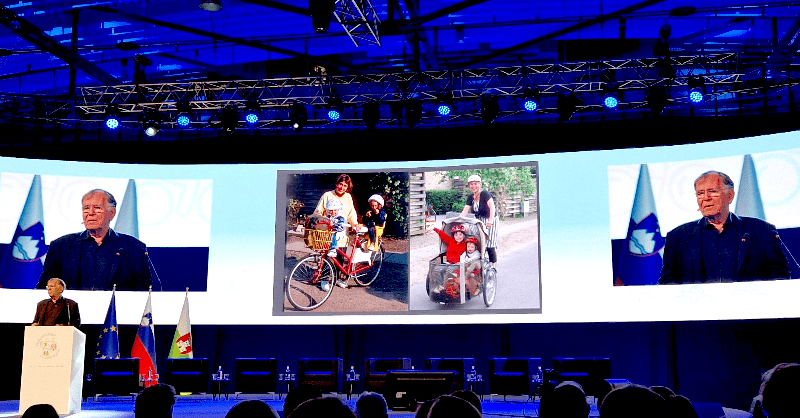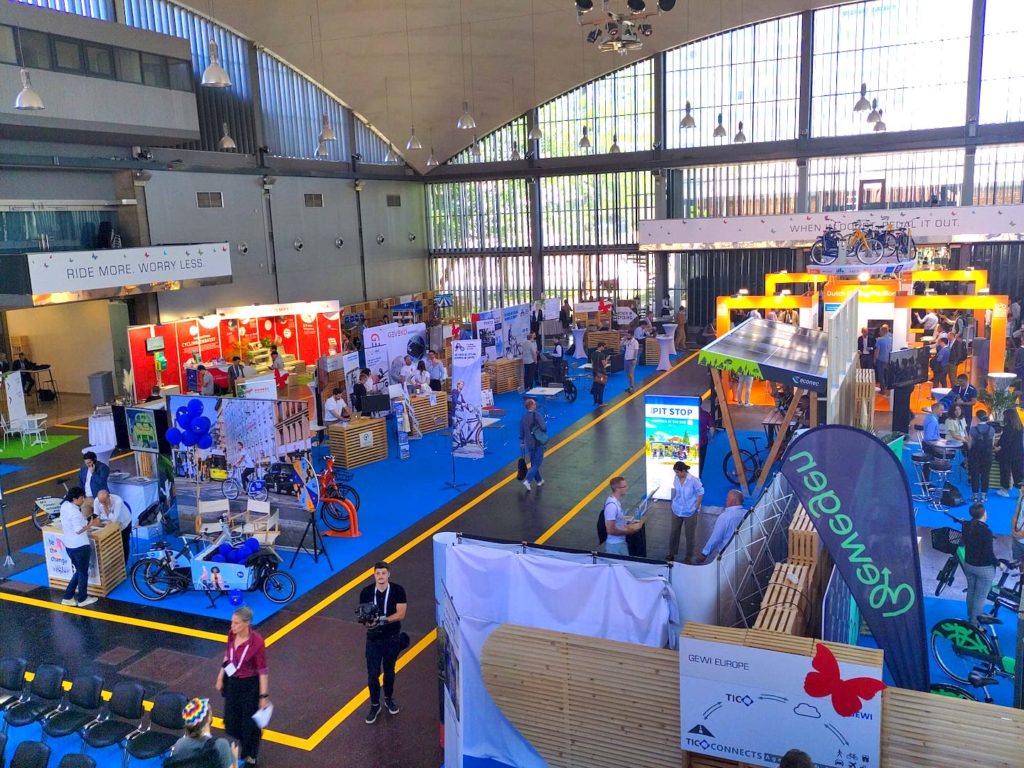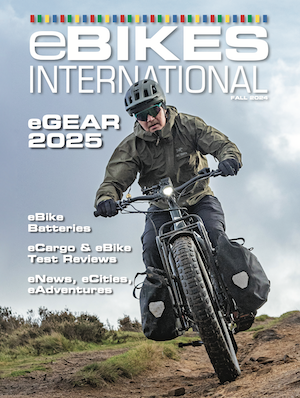June 15, 2022 - (Ljubljana, Slovenia) Finally, we are back! After nine months since we last met in Lisbon, Velo-city has returned, this time to the beautiful city of Ljubljana. We hoped you enjoyed your first day as much as we did, with our host city certainly living up to its name as one of Europe’s leading cycling cities.

However, with so much cycling knowledge and expertise gathered under one roof, it’s easy to miss a thing or two. But don’t worry, the ECF Daily Report is back to fill you in on all the highlights from Day 1!
QUOTE OF THE DAY
Can bicycle activism save the world? Yes, I’ve seen it done and I’ve seen wonderful results for the world. – Jan Gehl, Founder, Architect and Professor of Urban Design, Gehl Architects
Opening Plenary: Cycling the Change
Velo-city got underway on a musical note this morning, with Slovenian singer Sara Lampreãnik performing a live rendition of the official conference anthem, “Change is Strange”. Following her energetic performance, Mayor Zaron Jankovic officially kicked things off with a speech, outlining Ljubljana’s major strides towards more cycling and recent history as a city of green urban innovation.
He explained, “We worked very hard to change opinions about cycling. We hope that we can continue to encourage more people to cycle and connect Ljubljana to municipalities around the capital.”

Much like the conference’s emblematic butterfly, the themes of transformation and change were at the fore throughout the plenary. Amidst the discussions, legendary Danish architect and professor of urban design, Jan Gehl provided a key takeaway to keep in mind when introducing more cycling to our cities: “Bicycling is sometimes about traffic from A to B. But it is always about people.”
Adding to this, CEO of the Institute for Transportation and Development Policy, Heather Thompson, highlighted the need to address the gender imbalance amongst cyclists and make cycling accessible for all, asserting that “80-90% of riders in many cities are male – not by choice, but by circumstance.”
Tuesday’s session highlights
The first of today’s parallel sessions shifted the focus from large cities to rural areas. “Exploring the potential of cycling in small cities and rural areas” discussed how we can create positive cycling eco-systems in rural areas. Key features included “2-1-roads”, multimodal bicycle parking, cycling rental services, communication, and awareness campaigns, all of which were highlighted as important methods of fostering a true cycling culture in rural areas.
Next up was the CIVITAS Handshake project, which delivered plenty of useful resources to hasten the adoption of cycling best practices in multiple European cities. Project partners from Amsterdam, Copenhagen and Munich presented new “bikenomics” figures (for example, did you know every euro invested in cycling generates 3.6 euros worth of benefits?). The session concluded with the launch of a new city self-assessment tool to evaluate cycling success.

At the “Kids on bikes: early practice for an active lifestyle” session, experts and educators from Austria, Belgium, Ecuador, France, Hungary, and Slovenia presented several training initiatives, such as the Safe4Cycle project, designed to help children cycle safely and responsibly. Jérôme Veriter of Pro Velo put it simply: schools are a great environment to train kids to tackle different obstacles (like terrain challenges) and practice/ learn safe cycling and boost confidence. Involving all stakeholders, especially parents, early in the process to increase programme completion rates was key.
Elsewhere, ECF CEO Jill Warren moderated the session on Tactical Urbanism, which focused on perseverance and strong organisational tactics when encouraging more cycling in cities through cultural shift and temporary infrastructure.
More technical sessions focused on data in cycling and methodologies for assessing the safety of cycle routes using the European Certification Standard (ECS) – allowing for cycle route assessment at a European scale, bringing together comparable data from countries with very different levels of cycling development.
Spotlight Session: Public space reallocation across European cities
For many cities, the allocation of public space poses a key issue. In many cities the amount of space available can be a scarce resource. Today, members of ECF’s Cities & Regions for Cyclists Network came together for a parallel session to discuss the question: how should cities reallocate space?
The network displayed its strength in diversity with speakers from a range of successful cycling cities including Zurich, Groningen, Copenhagen, Helsinki, Slovenia and the Spanish Network of Cycling Cities (Red de Ciudades por la Bicicleta).
A central theme of the discussion was the need to bid farewell to car-centric planning, moving beyond functionality towards liveability. For example, Oskari Kaupinmäki described how Helsinki’s human-centric approach to urban planning means bicycle traffic is now accounted for in all traffic, and accessibility is considered in turns of human flow instead of traffic flow.
Another key point came from Nacho Tomás Ruiz, who gave the audience a comparative overview on the public space approach of members all around Spain, many of which are now implementing low-emission zones as a strategy to improve air quality, reduce congestion and encourage cycling as an alternative mode of transport.
Plenary 2: Policies for more cycling – from National Strategies to Traffic Reducing Measures
At the end of the day, delegates gathered once more to hear from a series of high-level speakers on what can be achieved when implementing plans at the international, national and local levels.
Beaming in live from Brussels, Georges Gilkinet stated that the European Union could not afford to snub the zero-emission transport mode that is the bicycle. With Belgium assuming the presidency of the Council of the European Union in 2024, “It’s only natural that I asked EU Commisioner Valean to make 2024 the year of cycling.” He quipped and finished with a resounding commitment to the audience stating that “As minister for mobility, I will do everything I can to put cycling at the heart of the debate.” Signing off with “Viva cycling!” for good measure.
Subsequent speakers stated ambitions to turn whole countries into nations of cycle commuters and to confront the auto industry’s firehose of advertising campaigns. Simona Larghetti of Bologna argued passionately for the democratising effect of 30km/h speed limits in cities as crucial “way to adapt the streets to life” and combat “car toxic cities”.
Communication is key. Both Simona and Filip Watteuw, Deputy Mayor of Ghent, recounted the fierce opposition that they faced when measures were proposed on a local level. However, both reiterated the need to maintain course, communicate clearly and remember that “You always know who is against it, but you underestimate how many people are in favour of it.”
The best of the rest
Amidst a packed agenda at #VC22, the topic of bicycle parking as a catalyst for high rates of bicycle use was under the spotlight. Speakers from industry and cities stressed the importance of more parking to tackle bike theft, and support those wanting to cycle more often. Taking parking away and replacing it with bicycle racks was championed by the City of Utrecht – and the importance of accessibility stressed.
Introducing ECF Awards 2022
This year ECF will be crowning four winners with the aim to promote best practices in cycling, highlight key successes across the world of everyday cycling.
• Cycle-Friendly Employer Award, kindly sponsored by JobRad “We get people cycling”
• Cycling Improvement Award, kindly sponsored by Eco-Counter “Providing communities with the necessary tools to collect and communicate the data they need.”
















